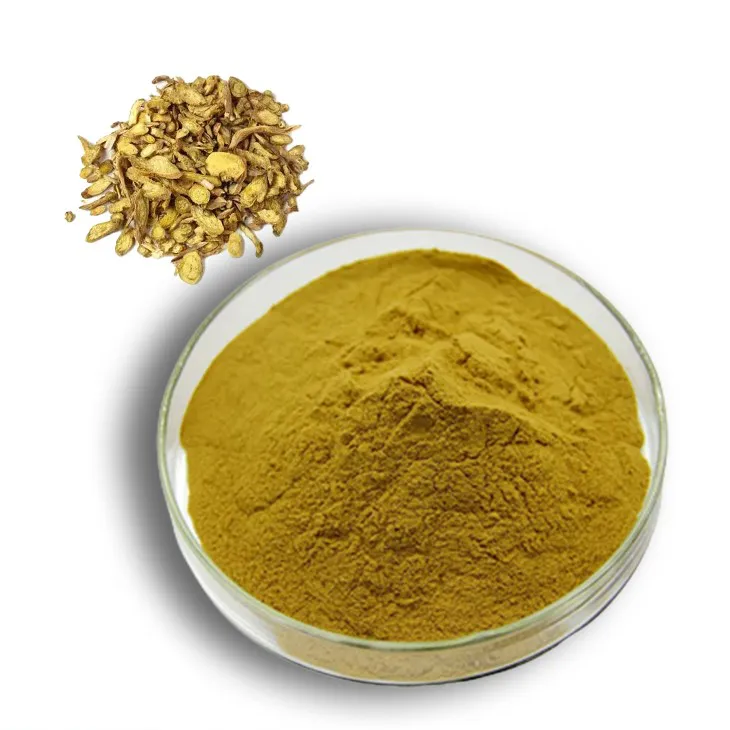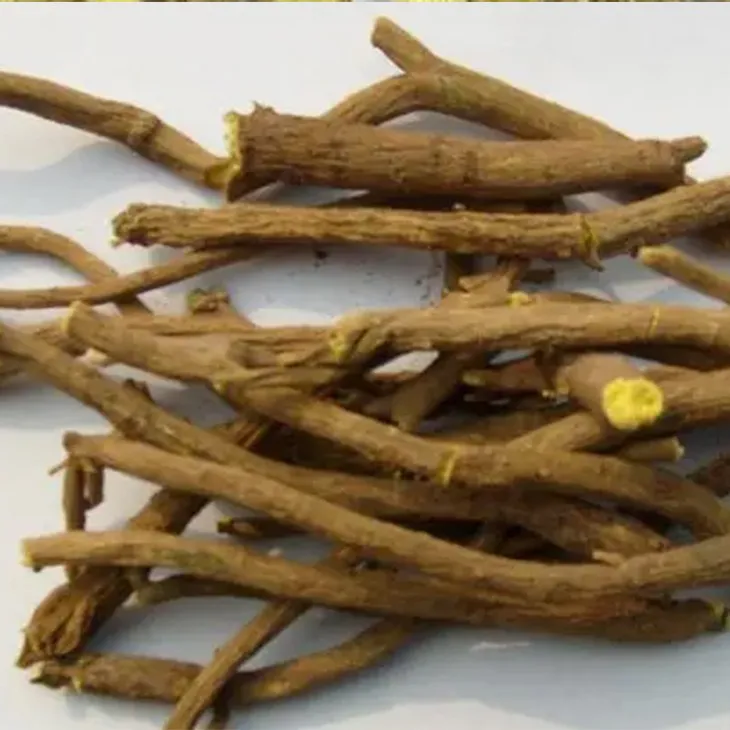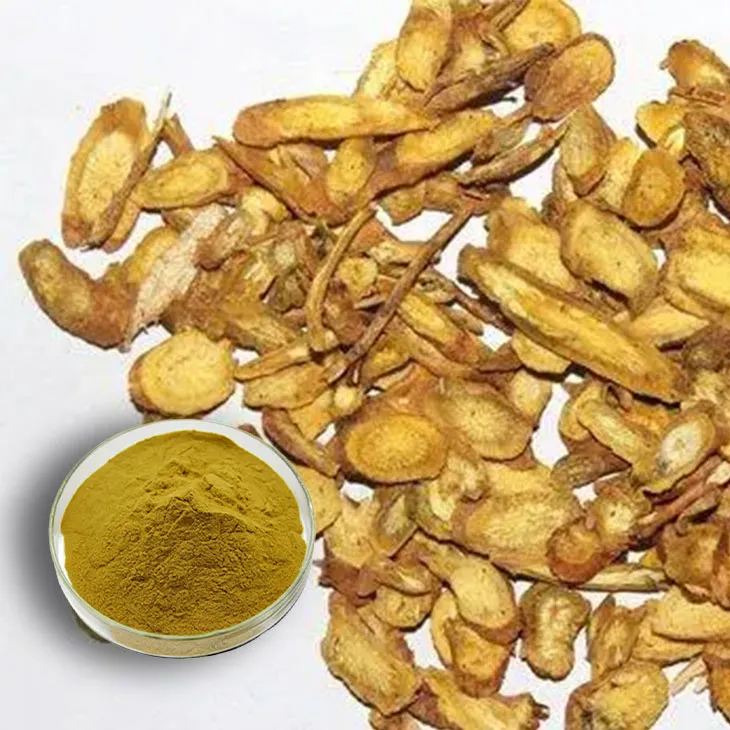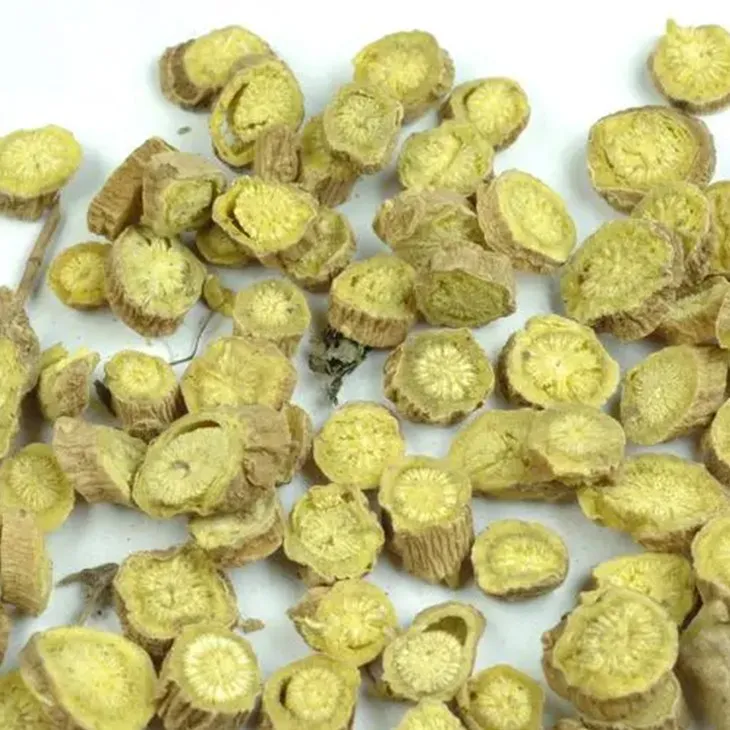- 0086-571-85302990
- sales@greenskybio.com
The best baicalin in nature.
2024-11-30

Introduction to Baicalin
Baicalin is indeed a remarkable substance found in nature. It is a flavonoid glycoside that is derived from the roots of Scutellaria baicalensis, a plant with a long history of use in traditional medicine systems. Baicalin's chemical structure is complex, consisting of a flavone aglycone, baicalein, and a glucuronic acid moiety. This unique structure endows it with a wide range of biological activities.

Baicalin and the Immune System
Enhancing Immune Response
One of the most important aspects of baicalin is its role in the immune system. It has been shown to enhance the immune response in several ways. Baicalin can stimulate the production of immune cells such as macrophages and lymphocytes. Macrophages play a crucial role in the innate immune system by engulfing and destroying pathogens. By increasing the activity and number of macrophages, baicalin helps the body to better recognize and eliminate invading microorganisms.
Lymphocytes, on the other hand, are key players in the adaptive immune system. Baicalin can modulate the function of lymphocytes, enhancing their ability to produce antibodies and cytokines. Cytokines are small proteins that act as messengers between cells in the immune system, coordinating the immune response. Through these mechanisms, baicalin enables the body to mount a more effective defense against a variety of pathogens, including bacteria, viruses, and fungi.

Baicalin in Traditional Medicine
Treating Common Ailments
Baicalin has a long - standing history of use in traditional medicine. In traditional Chinese medicine (TCM), for example, it has been used for centuries to treat various ailments. One of the common uses is in the treatment of fever. Baicalin has antipyretic properties, which means it can help reduce body temperature. This is thought to be related to its ability to modulate the body's inflammatory response. When the body is infected with a pathogen, it often responds with an inflammatory reaction that can lead to fever. Baicalin can act on the immune and inflammatory pathways to bring down the fever.
Another traditional use of baicalin is in the treatment of cough. It has expectorant and antitussive effects. By loosening mucus in the airways and suppressing the cough reflex, baicalin can relieve cough symptoms. This is beneficial for patients with respiratory infections or other conditions that cause coughing.
Baicalin has also been used in the treatment of liver disorders. In TCM, the liver is considered an important organ for maintaining overall health. Baicalin can protect the liver from damage, improve liver function, and promote the regeneration of liver cells. It may achieve this through its antioxidant and anti - inflammatory properties, which can reduce oxidative stress and inflammation in the liver.

Modern Research on Baicalin: Cancer Prevention and Treatment
Anti - Tumorigenic Properties
In modern research, baicalin has shown great potential in the prevention and treatment of cancer. It has been found to possess anti - tumorigenic properties. One of the mechanisms underlying this is its ability to regulate cell growth and apoptosis. Apoptosis, or programmed cell death, is a natural process that helps to remove damaged or abnormal cells from the body. In cancer, this process is often disrupted, leading to the uncontrolled growth of tumor cells.
Baicalin can induce apoptosis in cancer cells by activating certain signaling pathways. For example, it can upregulate the expression of pro - apoptotic proteins and downregulate anti - apoptotic proteins. This imbalance tips the scales in favor of cell death, thereby inhibiting the growth and spread of tumors.
Baicalin can also interfere with the cell cycle of cancer cells. The cell cycle is a series of events that a cell goes through to divide and replicate. Cancer cells often have abnormal cell cycle regulation, which allows them to divide uncontrollably. Baicalin can arrest the cell cycle at specific checkpoints, preventing cancer cells from dividing further.
Moreover, baicalin has been shown to have anti - angiogenesis properties. Angiogenesis is the process by which new blood vessels are formed. Tumors need a blood supply to grow and metastasize. By inhibiting angiogenesis, baicalin can starve tumors of the nutrients and oxygen they need to survive, thereby suppressing tumor growth.

Baicalin and Neuroprotection
Benefits for Neurodegenerative Diseases
Baicalin also exhibits neuroprotective effects, which are of great significance for neurodegenerative diseases. Neurodegenerative diseases, such as Alzheimer's disease and Parkinson's disease, are characterized by the progressive loss of neurons in the brain. Baicalin can protect neurons from damage in several ways.
One way is through its antioxidant activity. The brain is highly vulnerable to oxidative stress due to its high metabolic rate and abundance of polyunsaturated fatty acids. Oxidative stress can cause damage to neurons, leading to neurodegeneration. Baicalin can scavenge free radicals and reduce oxidative stress in the brain, thereby protecting neurons from damage.
Baicalin can also modulate neuroinflammatory responses. In neurodegenerative diseases, there is often an increase in neuroinflammation. This inflammation can further damage neurons and exacerbate the disease process. Baicalin can suppress the activation of microglia, the immune cells in the brain, and reduce the production of inflammatory cytokines. By reducing neuroinflammation, baicalin helps to protect the brain from neurodegenerative processes.
Furthermore, baicalin has been shown to promote neuronal survival and regeneration. It can enhance the expression of neurotrophic factors, which are proteins that support the growth, survival, and differentiation of neurons. By promoting neuronal survival and regeneration, baicalin may have the potential to slow down or even reverse the progression of neurodegenerative diseases.
Future Research and Prospects
Despite the extensive research on baicalin, there are still many aspects that need further exploration. One area of future research is the development of more effective extraction and purification methods for baicalin. Currently, the extraction process may be complex and time - consuming, and improving the extraction efficiency can help to increase the availability of baicalin for further research and potential clinical applications.
Another aspect is the in - depth study of the mechanisms of action of baicalin. Although we have some understanding of how baicalin exerts its various effects, there are still many unanswered questions. For example, how does baicalin interact with different signaling pathways in the body? What are the specific molecular targets of baicalin? Understanding these mechanisms in more detail will help to better harness the potential of baicalin in the treatment of diseases.
Clinical trials also play an important role in the future of baicalin research. While pre - clinical studies have shown promising results, more clinical trials are needed to evaluate the safety and efficacy of baicalin in humans. These trials will help to determine the appropriate dosage, treatment duration, and potential side effects of baicalin, paving the way for its wider use in the medical field.
In conclusion, baicalin is truly nature's best in terms of its diverse health - promoting functions. Its potential in the immune system, traditional medicine, cancer prevention and treatment, and neuroprotection makes it a highly valuable substance. With continuous research, we can expect to unlock more of its secrets and fully utilize its benefits for human health.
FAQ:
What is baicalin?
Baicalin is a precious natural substance with a complex chemical structure.
What are the functions of baicalin in the immune system?
Baicalin can enhance the immune response, enabling the body to resist various pathogens more effectively.
What is the role of baicalin in traditional medicine?
In traditional medicine, baicalin has a long - standing history of use for treating ailments such as fever, cough, and liver disorders.
How does baicalin play a role in preventing and treating chronic diseases?
Modern research has found that baicalin has anti - tumorigenic properties which may be related to its ability to regulate cell growth and apoptosis. It also has potential in preventing and treating chronic diseases like cancer.
What are the neuroprotective effects of baicalin?
Baicalin has neuroprotective effects, which could be valuable for neurodegenerative diseases.
Related literature
- Baicalin: A Review of Its Pharmacological Properties"
- "The Potential of Baicalin in Modern Medicine"
- "Baicalin: Nature's Gift for Health"
- ▶ Hesperidin
- ▶ citrus bioflavonoids
- ▶ plant extract
- ▶ lycopene
- ▶ Diosmin
- ▶ Grape seed extract
- ▶ Sea buckthorn Juice Powder
- ▶ Beetroot powder
- ▶ Hops Extract
- ▶ Artichoke Extract
- ▶ Reishi mushroom extract
- ▶ Astaxanthin
- ▶ Green Tea Extract
- ▶ Curcumin Extract
- ▶ Horse Chestnut Extract
- ▶ Other Problems
- ▶ Boswellia Serrata Extract
- ▶ Resveratrol Extract
- ▶ Marigold Extract
- ▶ Grape Leaf Extract
- ▶ blog3
- ▶ blog4
-
High - quality kidney bean extract products.
2024-11-30
-
The best aged garlic extract on the market.
2024-11-30
-
How to make powder with L - arginine.
2024-11-30
-
Certified organic hawthorn extract.
2024-11-30
-
Bulk purchase of mulberry leaf extract.
2024-11-30
-
Wholesale Suppliers of Eyebright Extract.
2024-11-30
-
Natural grape seed extract
2024-11-30
-
Black Pepper Extract
2024-11-30
-
Europen Bilberry Extract
2024-11-30
-
Honeysuckle Pollen
2024-11-30
-
Kidney Bean Extract
2024-11-30
-
Wheat Germ Extract
2024-11-30
-
Avocado Extract Powder
2024-11-30
-
Sea buckthorn oil
2024-11-30
-
Polygonum multiflorum extract
2024-11-30
-
Ginger Extract
2024-11-30





















